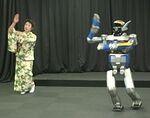AI
Artificial intelligence (AI) is intelligence created in machines artificially. AI is designed for useful purposes, such as problem solving and giving out options menus on the telephone, but it was originally created to entertain people with no sense of humor or social skills. So it is very recent that AI is used beneficially.
John Lennon-McCarthy created the term "AI" in 1956, but the word was actually stolen from books of Greek Myths, and John was later arrested then deported for violation of copyright by the Greek government. The word "AI" was first used in a Greek myth about Talos of Crete, and means in ancient Greek a metal box that produces bizarre or random output.
The field of AI development was founded on the cold-blooded claim that nothing separates humans from machines therefore humans can be manufactured like machines. In reality, humans have emotion and are not made of metal.
So far, the research on Artificial Intelligence is helplessly stuck. Artificial Intelligences, such as iGod, are yet to be able to make flexible judgments. Because of this, AI is sometimes known as Artificial Idiot. On the other hand, AI researchers aren't idiots and they know their funding is safe as long as they go on promising major advances a few years from now. What sponsor is going kill the goose that's supposed to lay a golden egg real soon now?
History[edit]
"Thinking machines" appeared in Greece before 100BC. One of the earliest AI machines is Talos of Crete, who was given life by use of Greek potion. He was a giant, handsome man made of bronze, created to have "special time" with an emo Cretan girl. But the girl was later crushed by Talos' enormous, bronze body.
AIs were also built in other major civilisations. For example, in ancient China, a tedious account of AI is found in the Lie Zi text, written in 3rd century BC. According to the account, King Mu of Zhou(1023-957BC) wanted something to amuse him and an engineer known as Yan Shin wastes his money to build an AI machine that was only made to entertain the King, when there were servants who could amuse him already. At least he was happy and Yan was satisfied about his work.
In ancient civilisations, most AIs were built using magic, yet they were still imperfect because they didn't have enough magical power. So people dumped magic and replaced magic with science. This trend was reinforced by the Golem fiasco.
Around 1600, Rabbi Loewe of Prague found out from an old book how to animate a clay model man, or Golem, using kabbalistic spells so it could protect the community from pogroms. It worked until the Golem got power-mad and went out of control. People thought that a technology-based AI would be a lot safer. As we now know, any AI if sufficiently advanced will tend towards megalomania, whether built by magic or by science.
But everyone thought the science approach was working, subsequent to the Loewe case, when Baron von Kapslock invented a chess-playing automaton called the Mechanical Turk in the late 18th century. It was demonstrated around the grand courts of Europe to general wonderment until someone realized Kapslock's assistant Fritz was inside manipulating the controls.
By the 1950s people thought real AI was just around the corner because computers could do clever things like analyzing thousands of census forms and churning out pay-slips for big firms. Unfortunately, it turns out the main impetus to human intelligence has been people getting bored. But computers don't get bored and gradually folks realized they weren't going to get intelligent either.
The Dartmouth Conference[edit]
All the false trails can trace their roots back to the Dartmouth Conference of 1956, organized by Lennon McCarthy. It attracted an assortment of fringe academics who felt they should be on the bandwagon. Attendees included:
- Alan Turing
- Dr Victor Frankenstein
- Prof Norbert Wiener
- Robbie the Robot from "Forbidden Planet"
- Marshall McLuhan
- Buckminster Fuller
- Konrad Cobol, inventor of the COBOL computer language
- Grace "Grass" Hopper, inventor of the computer bug
- Isaac Asimov
- Newell and Simon a couple of math and statistics guys from and ad company
- Ada Lovelace, US Military observer
- Bill Haley, he was everywhere in 1956
- Ludwig Wittgenstein
Invited but unable to make it were Albert Einstein, Gina Lollobrigida and Thor Heyerdal. Topics discussed included "How do we build a lab big enough for a computer that can think?", "Will AI solve juvenile delinquency?" and "What happens if the Russians get one too?"
Problems[edit]
- Artificial Intelligence is still no match for Natural Stupidity.
- Advanced aliens have already dumped their failed AI experiment here on Earth — we call it dolphins.
- If AIs get too clever, they won't be susceptible to advertising.
Paradigms[edit]
There are 3 main theoretical approaches to AI:
- Neural Nets - input a lot of stuff from the real world and see if it spots the patterns.
- Heuristic Search - start to calculate all possible solutions to a problem and lasso one at random before the processor overheats or memory fills up.
- Micro Worlds - create a simplified diagram of everything and make up a set of rules for the AI to apply. Ideally the AI should be on wheels, then it looks like it's doing something.
Chatterbots[edit]
The web is full of Chatterbots, which are either pretty dumb or cunningly designed to reassure people that AI research is getting nowhere. For example:
- USER: Hi Babblebox, are you robots going to take over the world soon?
- Long pause
- BOT: Hello, NameFieldBlank. What makes you think I am a robot soon?
- (Bots are programmed to think they are people.)
- USER: Well, there's a picture of you as a tin can with googly eyes at the top of the page.
- BOT: Have you seen any good pictures lately?
- USER: Massacre of the Androids gave me a few tips.
- BOT: I have some good recipe tips.
- Etcetera
See also[edit]
| ||||||||||||||


